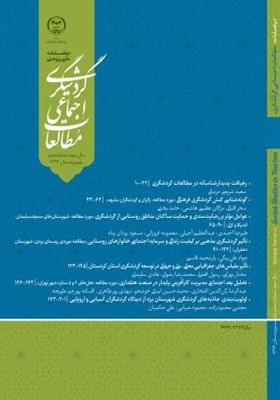تأثیر مقیاس¬های جغرافیایی محلی، ملی و جهانی در توسعه گردشگری استان کردستان
محورهای موضوعی :
1 - دانشگاه تهران
کلید واژه: توسعه گردشگری, مقیاس¬, های محلی, ملی و جهانی, استان کردستان.,
چکیده مقاله :
گردشگری، فعالیتی پیچیده و چند بعدی است و برنامه ریزی برای توسعه آن نیازمند سازگاری و همسویی اقدامات در سطوح مختلف تصمیم گیری است. توسعۀ گردشگری، زمانی امکان پذیر است که اقدامات عملی در مقیاس محلی با سیاست گذاری کلان در مقیاس ملی و روندهای در حال گذار در مقیاس جهانی در یک جهت قرار گیرند. این پژوهش بر آن است تا اثرات مقیاس های محلی، ملی و جهانی را بر توسعه گردشگری در استان کردستان در غرب ایران بررسی نماید و سپس با تعیین مهمترین مقیاس اثرگذار بر توسعه گردشگری در محدوده مورد مطالعه، مهمترین عواملی را که در مقیاس های سه گانه فوق منجر به وضعیت عدم توسعه گردشگری در این مکان شده است، شناسایی کند. پژوهش حاضر از نوع کاربردی و روش تحقیق در آن توصیفی - تحلیلی است و شیوۀ گردآوری داده ها نیز اسنادی و پیمایشی است. فرض اصلی تحقیق این است که مقیاس ملی با توجه به ماهیت بینابینی خود، بیشترین اثرگذاری را بر عدم توسعه گردشگری دارد و عوامل سیاسی که لزوماً درون حوزه گردشگری قرار نمی گیرد، مهمترین دلایل عدم توسعه گردشگری در استان کردستان به حساب می آید. یافته های کتابخانه ای و میدانی تحقیق هر دو فرضیه تحقیق را مورد تأیید قرار می دهد. بدین معنی که مقیاس های ملی، جهانی و محلی به ترتیب بیشترین اثرات را بر بهوجود آمدن وضعیت موجود داشته و «ضعف زیرساخت های حملونقل» و «وجود رویکرد امنیتی و سیاسی نسبت به جامعه محلی» در مقیاس محلی، «دیدگاه سیاسی و دینی ایدئولوژیک نسبت به سیاستگذاری گردشگری» در مقیاس ملی و «روابط تیره سیاسی میان ایران و کشورهای غربی» در مقیاس جهانی، مهمترین عوامل عدم توسعه گردشگری در استان کردستان است.
Tourism is a complex and multidimensional industry that planning for its development needs consistency and convergence of actions in different levels of decision-making. Tourism development is possible when practical actions in local scale will be aligned with macro policy-making in national scale and current trends in global scale. This research intends to survey the effects of local, national and global scales on the tourism development in Kurdistan province and then while determining the most affecting scale in tourism development in the studied area, identifying the most important factors in the mentioned triple scales that prevent developing of tourism in that area. This research is an applied analytical-descriptive study which benefits from qualitative methodology. The data were collected through desk research and field survey. Main assumption of this research is that national scale due to its interstitial nature has the most influence on tourism underdevelopment and political factors that necessarily are not related to tourism, are the most important causes of tourism underdevelopment in Kurdistan province. The field and desk research findings approve both assumptions of research. This means that national, global and local scales respectively have the most influence on emergence of status quo and “weakness of transport infrastructure”, “security and political approach towards the local community” in local scale, “political and religious ideological approach towards tourism policy making” in national scale and “strained political relations between Iran and the West” in global scale are the most important factors in tourism underdevelopment in Kurdistan province.


